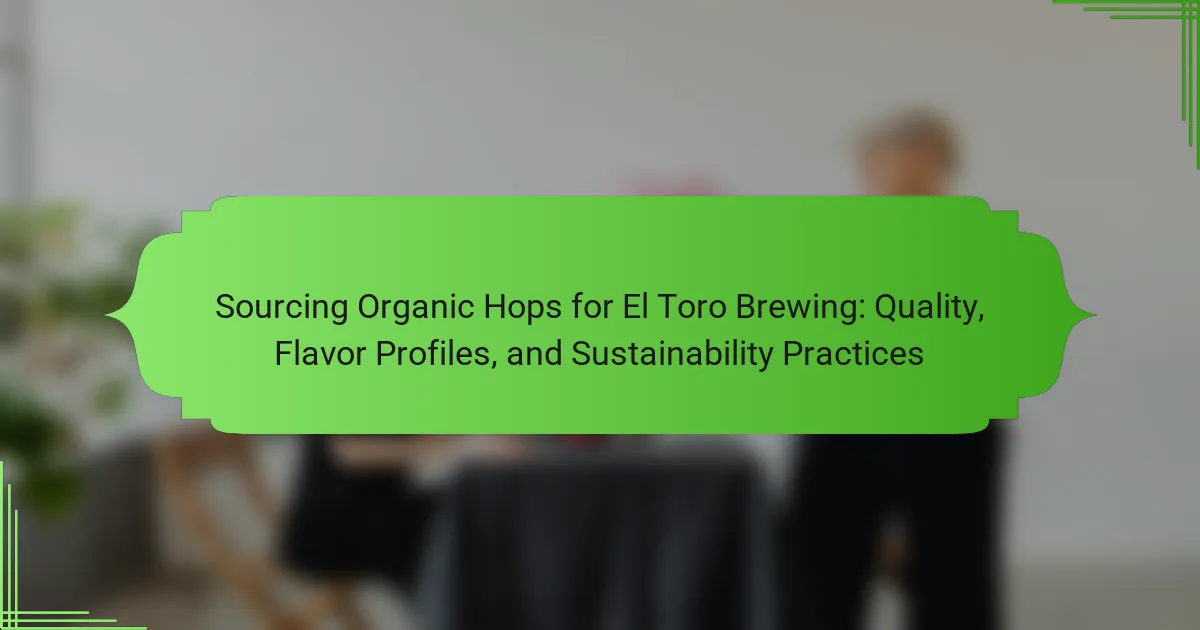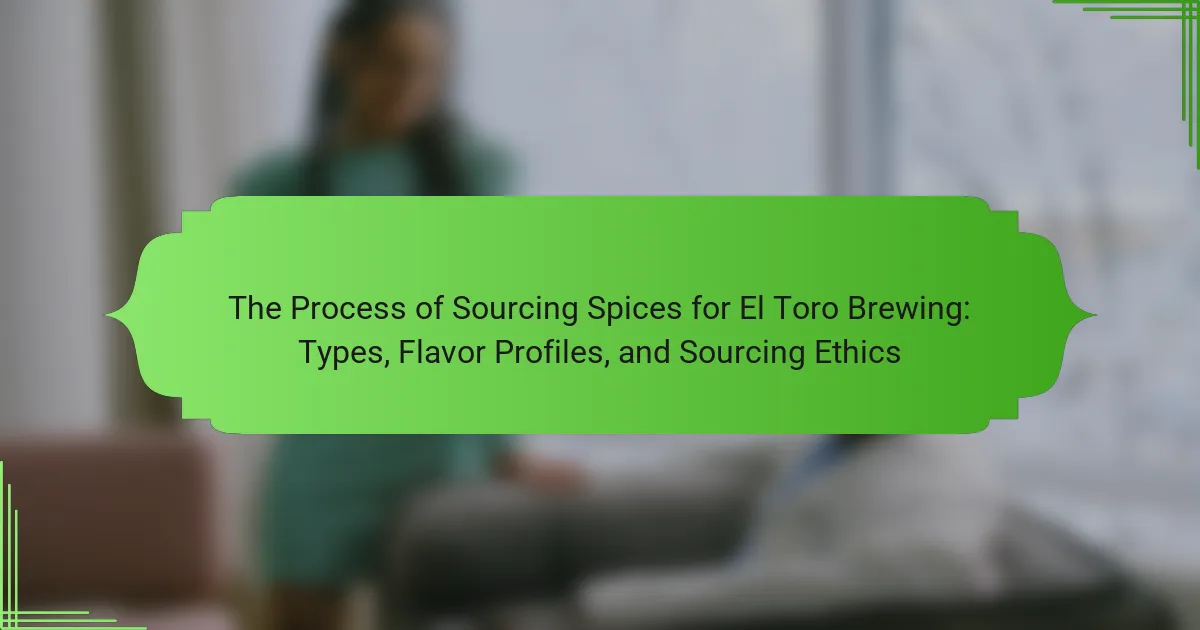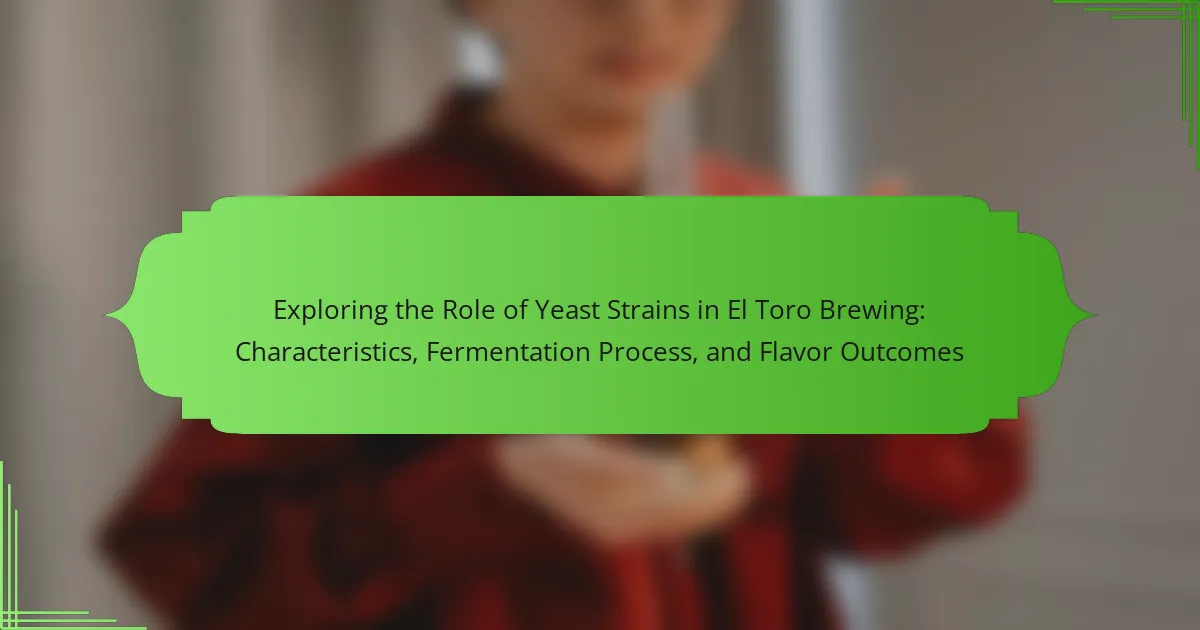El Toro Brewing focuses on sourcing organic hops to enhance the quality and flavor of their beers while promoting environmental sustainability. Organic hops are cultivated without synthetic pesticides or fertilizers, resulting in a more natural taste profile and supporting biodiversity and soil health. The brewery partners with trusted organic hop farms, conducting rigorous quality checks and maintaining close relationships with growers to ensure high standards. Future trends include local sourcing, innovative farming techniques, and a growing demand for unique hop varieties, aligning with consumer preferences for distinct craft beer experiences.
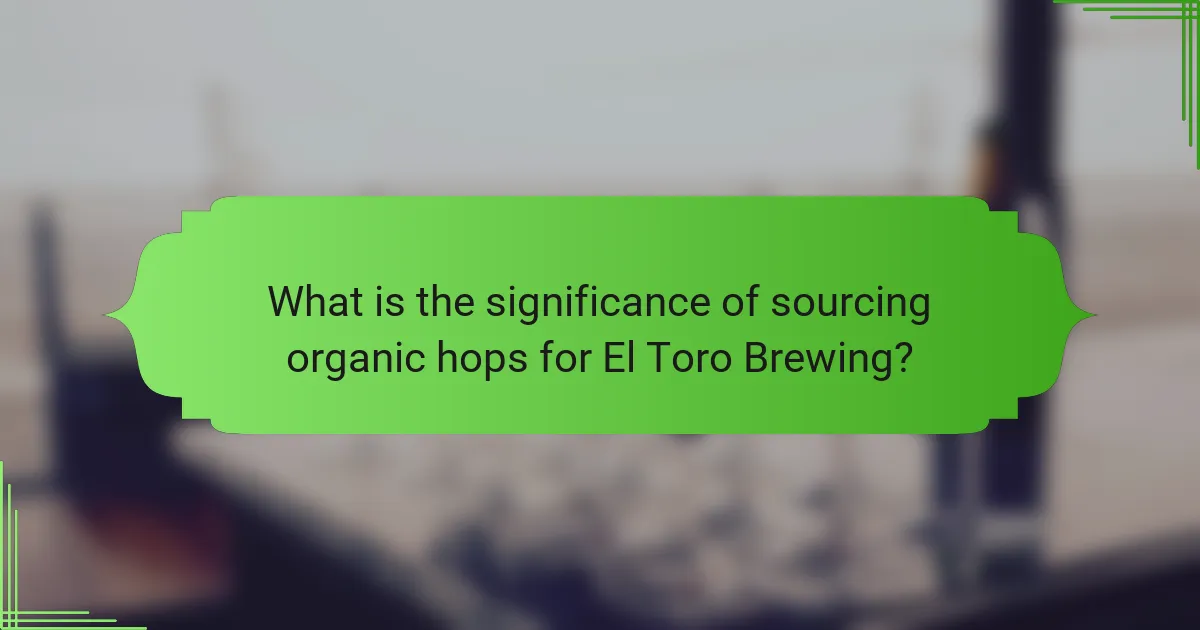
What is the significance of sourcing organic hops for El Toro Brewing?
Sourcing organic hops is significant for El Toro Brewing as it enhances the quality and flavor of their beers. Organic hops are grown without synthetic pesticides or fertilizers. This method leads to a more natural taste profile. Additionally, organic farming practices promote environmental sustainability. By choosing organic hops, El Toro Brewing supports biodiversity and soil health. This commitment resonates with consumers who value eco-friendly products. The use of organic ingredients can also improve brand reputation. Overall, sourcing organic hops aligns with their quality and sustainability goals.
How do organic hops differ from conventional hops?
Organic hops are cultivated without synthetic pesticides or fertilizers, unlike conventional hops. This results in a more environmentally friendly growing process. Organic farming practices enhance soil health and biodiversity. The absence of chemicals can lead to a distinct flavor profile in organic hops. Studies indicate that organic hops may have higher levels of certain essential oils and acids. These compounds contribute to unique aromas and tastes in beer. Furthermore, organic hops are often perceived as a premium product by consumers. This perception can influence market demand and pricing.
What are the key attributes of organic hops?
Organic hops are characterized by their cultivation without synthetic pesticides or fertilizers. They are grown using sustainable farming practices that promote soil health and biodiversity. Organic hops often exhibit unique flavor profiles, including floral, citrus, and herbal notes. These flavors can enhance the quality of craft beers. Additionally, organic hops are typically fresher due to local sourcing practices. Their production supports environmentally friendly agriculture. This aligns with consumer demand for sustainable products. Organic certification ensures compliance with strict agricultural standards.
Why is the sourcing process important for quality?
The sourcing process is crucial for quality because it directly impacts the characteristics of the final product. High-quality sourcing ensures that only the best organic hops are selected. These hops contribute to the desired flavor profiles and aromas in brewing. Additionally, sourcing from reputable suppliers guarantees consistent quality and sustainability practices. Studies show that hops sourced from certified organic farms have higher levels of essential oils, enhancing flavor. Quality sourcing also minimizes the risk of contaminants, ensuring a safer product for consumers. Thus, effective sourcing is integral to maintaining the overall quality of the beer produced.
What impact do organic hops have on beer flavor profiles?
Organic hops significantly influence beer flavor profiles by enhancing aroma and taste complexity. They often exhibit more vibrant and diverse flavor notes compared to conventional hops. This is due to the absence of synthetic pesticides and fertilizers, which can alter hop characteristics. Organic cultivation methods promote healthier soil and biodiversity, resulting in hops with more pronounced natural oils. These oils contribute to flavors such as citrus, pine, and floral notes. Studies show that beers brewed with organic hops can have a cleaner, fresher taste. Additionally, the unique terroir of organic hop farms can impart distinct regional flavors to the beer. This combination of factors leads to a more nuanced and enjoyable drinking experience.
How do different hop varieties influence flavor?
Different hop varieties significantly influence the flavor of beer. Each hop variety has unique aromatic oils and compounds. These compounds contribute distinct flavors and aromas, such as citrus, floral, or earthy notes. For instance, Cascade hops impart grapefruit and floral characteristics. Meanwhile, Saaz hops provide a spicy and herbal profile. The timing of hop addition during brewing also affects flavor intensity. Early additions enhance bitterness, while late additions boost aroma and flavor. Research indicates that the choice of hops can alter the beer’s overall flavor profile dramatically. This variability allows brewers to create diverse beer styles.
What are the tasting notes associated with popular organic hop varieties?
Popular organic hop varieties exhibit distinct tasting notes. Cascade hops are known for their floral and citrusy aromas, often with grapefruit notes. Citra hops provide tropical fruit flavors, particularly lime and passion fruit. Centennial hops have a balanced profile, combining citrus and floral notes with a hint of earthiness. Simcoe hops are recognized for their pine and apricot characteristics, delivering a complex aroma. Amarillo hops showcase orange and floral scents, contributing to a bright, zesty flavor. Each variety’s unique attributes enhance different beer styles, making them essential for brewers focused on quality and flavor.
What sustainability practices are involved in sourcing organic hops?
Sourcing organic hops involves several sustainability practices. These practices include crop rotation, which enhances soil health and reduces pest pressures. Organic hops are cultivated without synthetic pesticides or fertilizers. This method protects biodiversity and promotes ecological balance. Additionally, sustainable water management is critical in organic hop farming. Efficient irrigation techniques minimize water waste and enhance crop resilience. Farmers often utilize cover crops to improve soil fertility and prevent erosion. Certification processes ensure adherence to organic standards, promoting transparency in sourcing. These practices collectively contribute to a more sustainable brewing industry.
How do sustainable farming methods benefit the environment?
Sustainable farming methods benefit the environment by promoting biodiversity and reducing pollution. These methods often use crop rotation and cover crops, which enhance soil health. Healthier soil leads to better water retention and less erosion. Additionally, sustainable practices minimize the use of harmful pesticides and fertilizers. This reduction decreases chemical runoff into waterways. Studies show that organic farming can increase biodiversity by 30% compared to conventional methods. Sustainable farming also helps sequester carbon, mitigating climate change effects. Therefore, these practices contribute to a healthier ecosystem overall.
What certifications should El Toro Brewing look for in organic hops?
El Toro Brewing should look for USDA Organic certification in organic hops. This certification ensures that hops are grown without synthetic pesticides or fertilizers. Additionally, they should consider certifications like Non-GMO Project Verified. This verifies that the hops are free from genetically modified organisms. Another important certification is Certified Naturally Grown. This label signifies adherence to organic practices without the USDA certification process. These certifications collectively guarantee the quality and sustainability of the hops used in brewing.
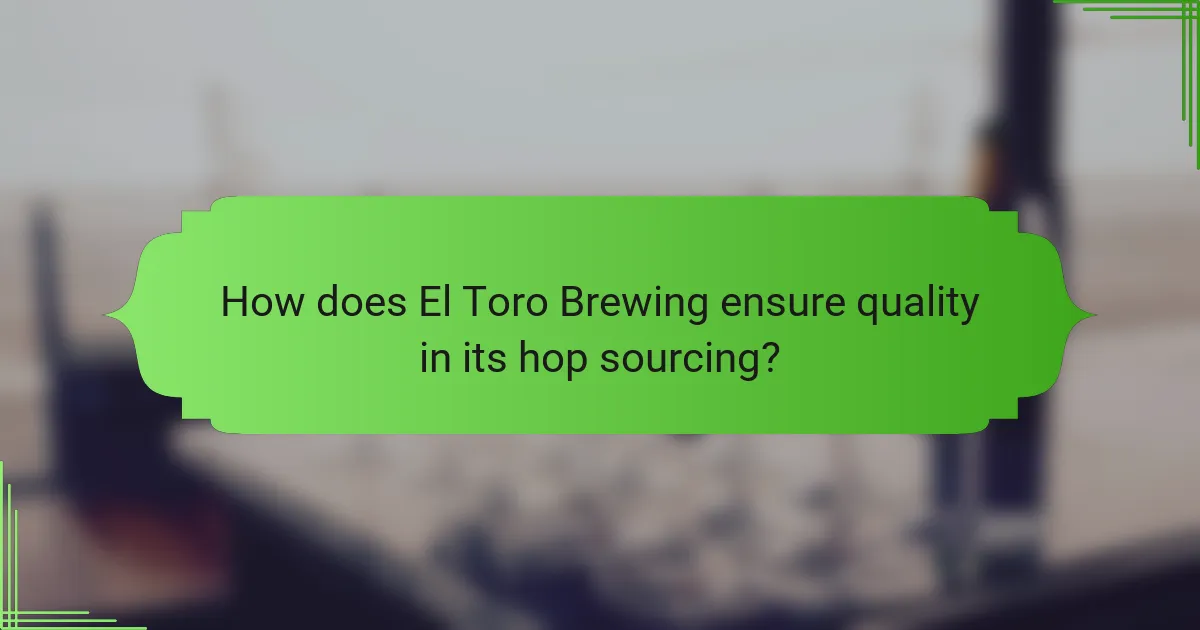
How does El Toro Brewing ensure quality in its hop sourcing?
El Toro Brewing ensures quality in its hop sourcing by partnering with trusted organic hop farms. They perform rigorous quality checks on hop samples before purchase. This includes assessing aroma, flavor, and overall freshness. El Toro also maintains close relationships with hop growers. This collaboration allows for transparency in farming practices. The brewery prioritizes sustainable and organic farming methods. They regularly visit farms to monitor growing conditions. Additionally, El Toro conducts sensory evaluations to ensure hop quality aligns with their brewing standards.
What quality control measures are implemented during sourcing?
Quality control measures implemented during sourcing include supplier audits, product testing, and traceability protocols. Supplier audits assess compliance with organic standards and quality requirements. Product testing involves analyzing hops for contaminants and flavor profiles. Traceability protocols ensure that each batch can be tracked back to its source. These measures help maintain high standards for organic hops used in brewing. Studies show that rigorous quality control reduces the risk of defects and enhances product consistency.
How does El Toro Brewing evaluate hop suppliers?
El Toro Brewing evaluates hop suppliers based on quality, sustainability practices, and flavor profiles. They prioritize suppliers who provide organic hops that meet specific quality standards. The evaluation process includes reviewing supplier certifications and conducting sensory analysis of hop samples. El Toro Brewing also considers the environmental practices of suppliers, ensuring they align with sustainable sourcing goals. Additionally, they maintain relationships with suppliers to ensure consistent quality and supply. This thorough evaluation process helps El Toro Brewing maintain high standards in their brewing operations.
What role does testing play in ensuring hop quality?
Testing plays a crucial role in ensuring hop quality. It evaluates the chemical composition of hops, including alpha acids and essential oils. These compounds directly affect flavor, aroma, and bitterness in beer. Regular testing helps identify any contaminants or defects in the hops. Quality control measures during processing also rely on testing to maintain consistency. Historical data shows that breweries using rigorous hop testing report higher customer satisfaction. Testing ensures that hops meet industry standards and consumer expectations. Accurate testing methods can predict the performance of hops in brewing applications. This systematic approach ultimately enhances the overall quality of the final product.
What partnerships does El Toro Brewing form to source organic hops?
El Toro Brewing partners with local organic hop farms to source its hops. These partnerships focus on sustainable agriculture practices. The breweries collaborate closely with farmers to ensure high-quality hops. They prioritize organic certification in their sourcing process. Additionally, El Toro Brewing supports regional agriculture by sourcing hops from nearby farms. This approach enhances the flavor profiles of their beers. It also contributes to the local economy. Overall, these partnerships align with El Toro Brewing’s commitment to sustainability.
How do collaborations with farmers enhance hop quality?
Collaborations with farmers enhance hop quality by ensuring optimal growing conditions and practices. Farmers can provide insights on soil health, pest management, and irrigation techniques. These practices lead to healthier hop plants with better flavor profiles. Research indicates that hops grown under precise conditions yield higher alpha acids, which contribute to bitterness and aroma. Additionally, direct partnerships allow brewers to select specific hop varieties suited to their flavor goals. This tailored approach results in hops that meet the unique needs of brewers like El Toro Brewing. Overall, these collaborations foster a deeper understanding of hop cultivation, ultimately improving the quality of the final product.
What are the benefits of sourcing locally for El Toro Brewing?
Sourcing locally provides El Toro Brewing with several key benefits. It enhances the freshness of ingredients, resulting in superior flavor profiles. Local sourcing supports regional farmers, fostering community relationships. This practice reduces transportation costs and carbon footprint. Additionally, it ensures better quality control over the hops used. Local hops often have unique characteristics that contribute to distinct beer styles. Studies show that local ingredients can improve customer loyalty and brand perception. Overall, sourcing locally aligns with sustainable practices, benefiting both the brewery and the environment.
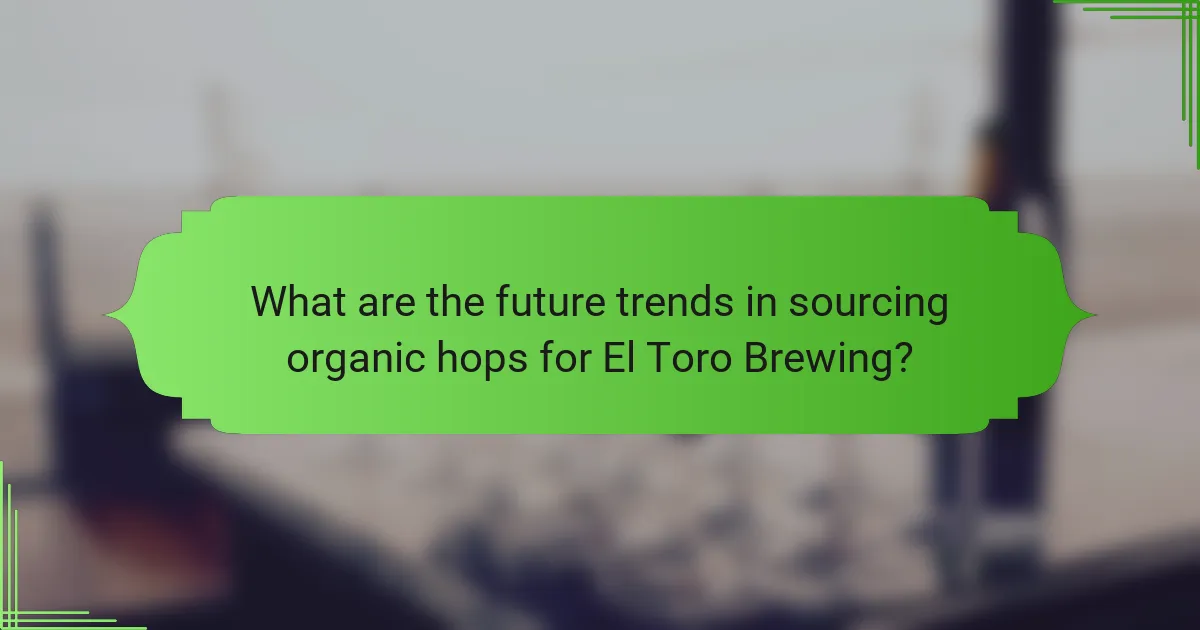
What are the future trends in sourcing organic hops for El Toro Brewing?
Future trends in sourcing organic hops for El Toro Brewing include a focus on local sourcing, sustainability, and innovative farming techniques. Local sourcing reduces transportation emissions and supports regional economies. Sustainability practices aim to minimize environmental impact while maximizing yield. Innovative farming techniques, such as precision agriculture, enhance hop quality and flavor profiles. Additionally, there is an increasing demand for unique hop varieties that offer distinct flavors. This trend aligns with consumer preferences for craft beers with unique taste experiences. Collaborations with local farmers are also expected to grow, fostering community relationships and ensuring a reliable supply chain.
How is consumer demand shaping hop sourcing practices?
Consumer demand is significantly influencing hop sourcing practices. Increased interest in unique flavors drives breweries to seek diverse hop varieties. This demand for distinct flavor profiles leads to a focus on specialty hops. Additionally, consumers are prioritizing sustainability, prompting breweries to source organic hops. The rise in eco-consciousness has resulted in a shift towards responsible farming practices. Data from the Brewers Association indicates a growing market for organic beer, reinforcing this trend. As a result, hop suppliers are adapting their cultivation methods to meet these consumer preferences. This alignment between consumer demand and sourcing practices enhances product quality and market competitiveness.
What innovations are emerging in organic hop cultivation?
Innovations in organic hop cultivation include the use of precision agriculture technologies. These technologies enhance efficiency in water and nutrient management. Integrated pest management (IPM) techniques are also gaining traction. IPM reduces reliance on chemical pesticides while maintaining crop health. Genetic research is leading to the development of disease-resistant hop varieties. These new varieties can thrive in organic systems with fewer inputs. Additionally, agroecological practices are being adopted to promote biodiversity. This approach improves soil health and enhances ecosystem services. The adoption of these innovations supports sustainable hop production.
How can El Toro Brewing adapt to changing market trends?
El Toro Brewing can adapt to changing market trends by sourcing organic hops to meet consumer demand for sustainability. This shift aligns with the increasing preference for eco-friendly products. By prioritizing organic ingredients, El Toro can enhance its brand image and attract environmentally conscious consumers. Research shows that 70% of consumers are willing to pay more for sustainable products. Additionally, offering unique flavor profiles from organic hops can differentiate El Toro’s beers in a competitive market. Engaging with local hop farmers can also foster community relationships and ensure a fresh supply. Adapting marketing strategies to highlight these sustainable practices will further resonate with current market trends.
What best practices should El Toro Brewing follow when sourcing organic hops?
El Toro Brewing should prioritize sourcing organic hops from certified organic farms. This ensures compliance with organic farming standards. They should establish direct relationships with hop growers to ensure quality and traceability. Regular visits to farms can help assess growing practices and hop quality.
El Toro Brewing should also evaluate the flavor profiles of hops through sensory analysis. This helps in selecting hops that align with their brewing style. Additionally, they should consider the sustainability practices of hop farms. Supporting farms that practice crop rotation and biodiversity can enhance ecological health.
Lastly, maintaining open communication with suppliers fosters transparency. This builds trust and ensures consistent quality in hop sourcing. Following these best practices will enhance the quality and sustainability of El Toro Brewing’s products.
How can El Toro Brewing maintain consistency in flavor and quality?
El Toro Brewing can maintain consistency in flavor and quality by implementing strict quality control measures. These measures include sourcing organic hops from reliable suppliers with established standards. Consistent brewing techniques also play a crucial role in achieving uniformity. Regular equipment maintenance ensures that brewing conditions remain stable. Additionally, conducting regular taste tests helps identify any variations in flavor. Documenting all processes allows for transparency and reproducibility. Training staff on quality standards reinforces the importance of consistency. By combining these practices, El Toro Brewing can deliver a reliable product to consumers.
What strategies can be employed to ensure sustainable sourcing?
Implementing sustainable sourcing strategies involves several key practices. First, establishing long-term relationships with local farmers promotes sustainable agriculture. This reduces transportation emissions and supports local economies. Second, adopting certification standards, such as organic or Fair Trade, ensures compliance with sustainability criteria. Third, utilizing technology for supply chain transparency helps trace the origin of materials. This can enhance accountability and reduce risks of unsustainable practices. Fourth, engaging in collaborative initiatives with other companies can amplify sustainability efforts. Research indicates that companies working together can achieve greater impact in sustainable sourcing. Lastly, regularly assessing and updating sourcing policies ensures alignment with evolving sustainability goals.
Sourcing organic hops is the central entity of the article, focusing on El Toro Brewing’s commitment to quality, flavor profiles, and sustainability practices. The article outlines the significance of organic hops, highlighting their cultivation without synthetic pesticides, which enhances flavor and promotes environmental sustainability. It discusses the differences between organic and conventional hops, the key attributes of organic hops, and the importance of sourcing practices for maintaining quality. Additionally, it explores how different hop varieties influence beer flavor, the sustainability practices involved in sourcing, and the future trends in organic hop sourcing that align with consumer demand for eco-friendly products.
